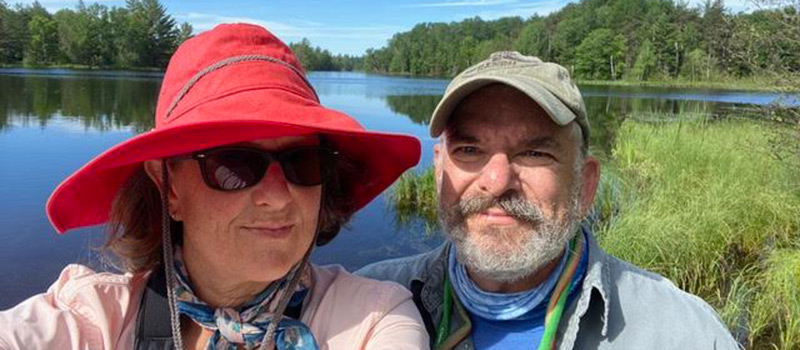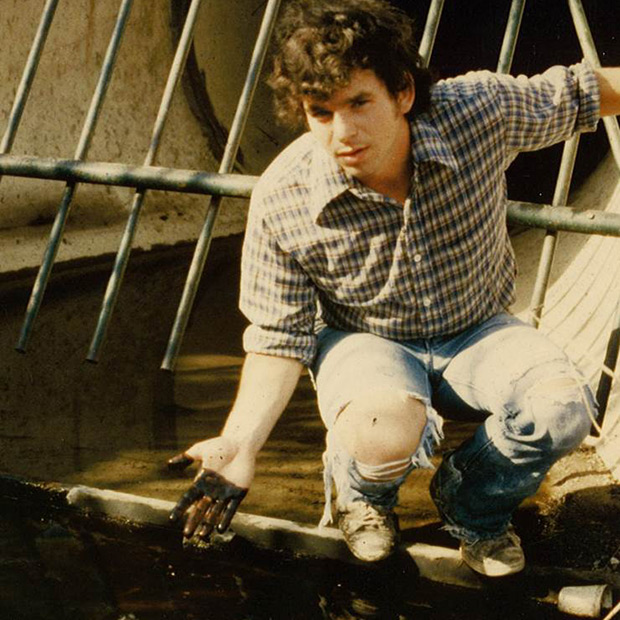Alumnus helping students explore careers in environmental fields
September 28, 2021 — Jonathan Higgins ’80 sees internships as a mechanism that allows students to explore and develop what they might want to focus on in their careers.
The senior freshwater scientist in the Global Protect Lands, Waters and Oceans program at The Nature Conservancy, Higgins recently established an internship fund through Grinnell College’s Center for Careers, Life, and Service (CLS) that will support students who wish to try out working in environmental conservation or management.
“It’s a great opportunity that didn’t exist when I was at Grinnell for students who are curious to explore their hypothesis about what they might want to do or want they might pursue in a graduate program,” Higgins says. “A great way to learn is through hands-on involvement and seeing how it plays out.”
 Brendan Hyatt ’22
Brendan Hyatt ’22
That’s exactly what Brendan Hyatt ’22 had in mind when he interned this summer with the Environmental Law Institute, a nonprofit organization based in Washington D.C. Hyatt was the first recipient of the Jonathan Higgins Internship in Environmental Conservation.
“I wanted to do something involving environmental policy and the legal field,” Hyatt says. “The Environmental Law Institute was the best of both worlds. They gave me the personal autonomy to do an independent research project of my choice, and I had ample opportunities to talk with subject expert staff members.”
“I wanted to do something involving environmental policy and the legal field,” Hyatt says. “The Environmental Law Institute was the best of both worlds. They gave me the personal autonomy to do an independent research project of my choice, and I had ample opportunities to talk with subject expert staff members.”
Hyatt’s research project was about disability and inclusion in local climate action planning in the U.S. He published an article on the subject and turned it to a Mentored Advanced Project (MAP) this semester with Eliza Willis, a senior faculty political science professor.
“There isn’t much academic or journalistic literature on the subject, and the issue is going to be a huge problem in the next couple of decades,” Hyatt says. “You can see it already with Hurricane Ida and other natural disasters.”
Higgins had been thinking for a while about what he could do to provide Grinnell students with opportunities to explore work in conservation. He was introduced to Mark Peltz, the Daniel and Patricia Jipp Finkelman Dean of Careers, Life, and Service, and they discussed and refined the internship opportunity. Higgins made a current use gift to launch the internship, and it is anticipated that the fund will be fully endowed by an estate gift.
 Jonathan Higgins ’80 and his wife, Susan Besson, are pictured on a recent canoe trip.
Jonathan Higgins ’80 and his wife, Susan Besson, are pictured on a recent canoe trip.
The fund will support an annual internship experience focused on conservation, management, monitoring, evaluation, strategy development, policy, or expanding funding opportunities. The internship may involve fieldwork, research, environmental or social aspects, advocacy work, public policy research or analysis, government relations, or related activities.
While similarly structured internship programs didn’t exist in Higgins’ student days at Grinnell, his adviser at the time pushed him to engage with organizations like the Iowa Department of Natural Resources and become a member of Iowa Academy of Sciences. Higgins also collaborated with biology professor Ken Christiansen on independent study projects.
“He gave me lab spaces along with a boat and truck I could take out to the Conard Environmental Research Area,” Higgins says. “I also did research at Arbor Lake with other students and presented some of our findings at a Grinnell City Council meeting when they were dealing with stormwater and sewage line issues. It was a start with freshwater ecology research and learning about some of the real-life issues in both urban settings and out in a research environment.”
 Jonathan Higgins as a student at Arbor Lake.
Jonathan Higgins as a student at Arbor Lake.
After earning a master’s degree and Ph.D in ecology and evolutionary biology from the University of Illinois-Chicago, Higgins became a contractor to the EPA Great Lakes National Program Office where he managed the water quality and biological sampling and analyses of the Great Lakes. From there, he took a job at The Natural Conservancy as a freshwater ecologist. He’s worked on conservation planning and management of freshwater ecosystems in the U.S., Latin America, Africa, India, and Asia for the past 27 years.
“It’s sort of like being in graduate school full time,” he says about working at The Nature Conservancy. “I’m always learning new things and meeting with really smart people. I was working all over the world on some interesting ecosystems and contexts for conservation. It’s not just putting a fence around something to conserve it; it really is dependent on engaging with the people and systems to define what it’s future should be. I’ve had a lot of doors open to me, working with policy people, government agencies, scientists, and academics.”
Higgins is now opening doors to current and future generations by helping prepare interns for successful careers in conservation or environmental management, or at least allowing them to experiment in those fields to see if it’s the correct fit.
Hyatt got a chance to speak with Higgins last month to express his gratitude. Since Environmental Law Institute interns are unpaid, the internship funding was important.
“It helped me cover living costs and helped me pursue this wonderful opportunity that I otherwise probably wouldn’t have been able to do,” Hyatt says. “I was looking at other internships, some of which were paid. But the paid ones, in my opinion, would have had me doing less important work. I’m grateful for alums who step up to the plate to provide opportunities like this for students.”
— by Jeremy Shapiro